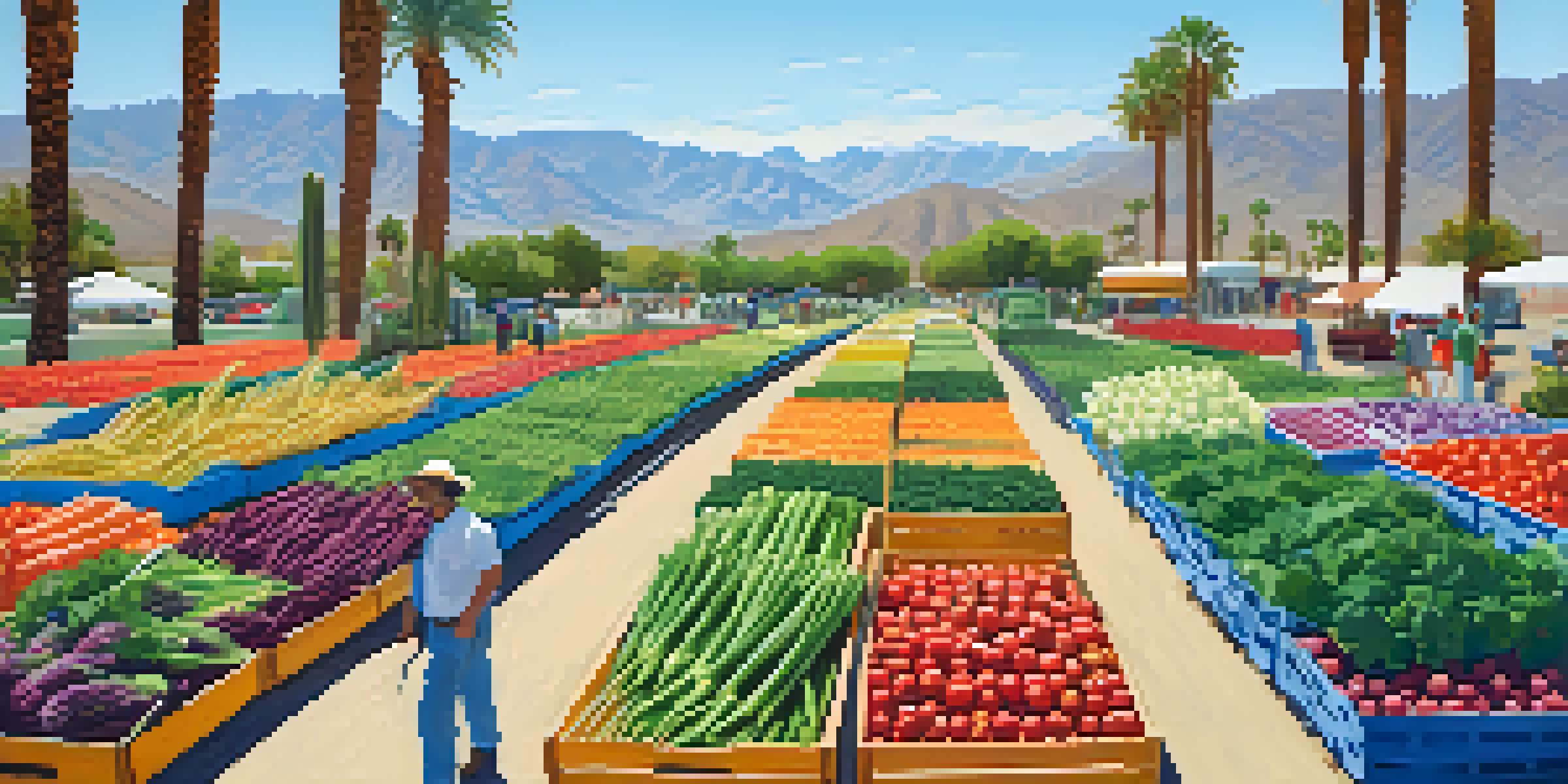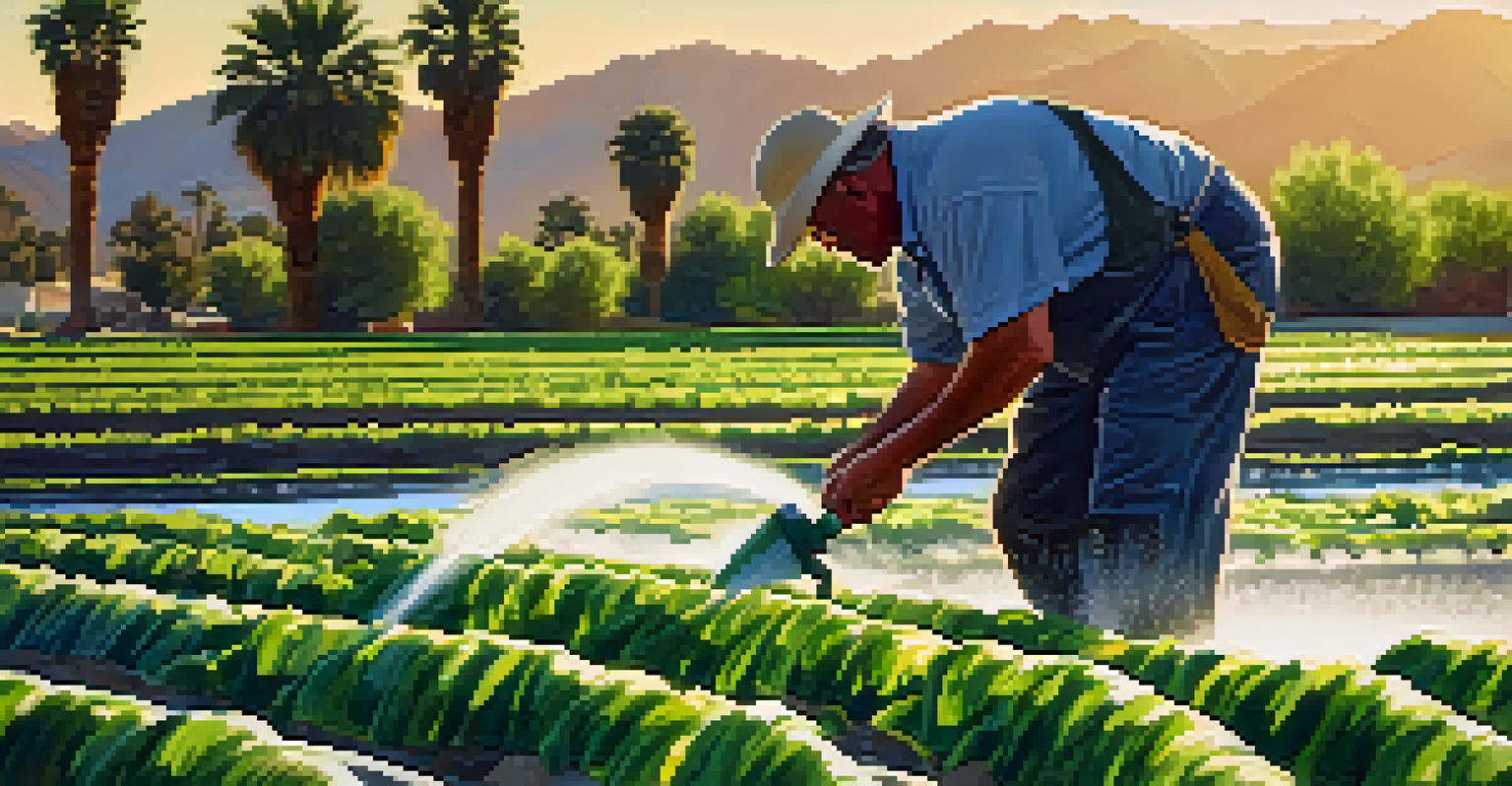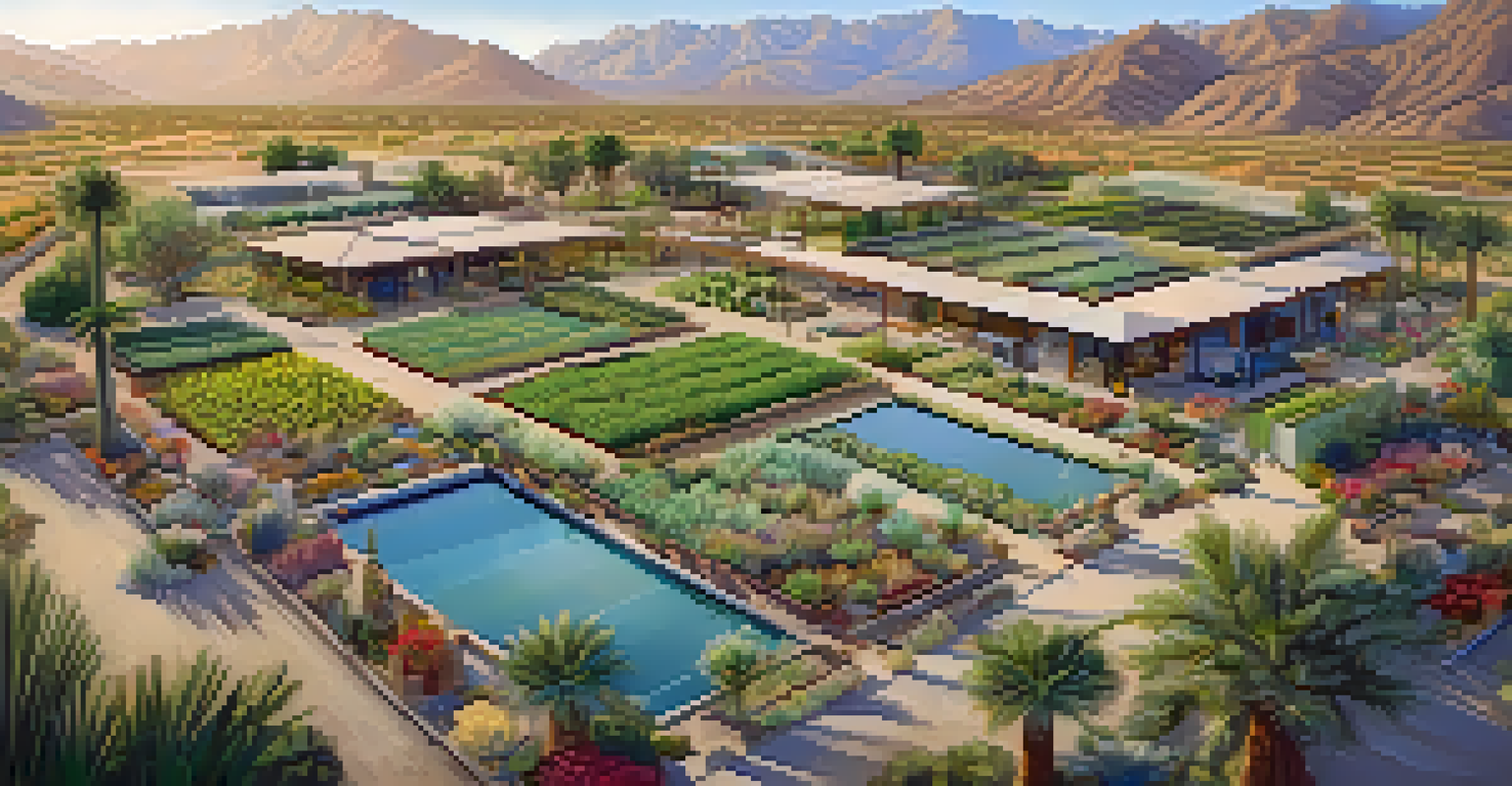Exploring Sustainable Farming Techniques in Palm Springs Area

Understanding Sustainable Farming: A Brief Overview
Sustainable farming refers to agricultural practices that focus on producing food in a way that is environmentally friendly and economically viable. It’s about ensuring that the farming processes do not deplete natural resources, allowing future generations to thrive. This approach often emphasizes biodiversity, soil health, and water conservation, critical elements for any successful farming operation.
Sustainable agriculture is a way of life that acknowledges the interdependence of all things and the need for balance.
In the Palm Springs area, with its unique desert climate, sustainable farming takes on special significance. Farmers must adapt their methods to cope with limited water resources while still producing crops that can thrive in arid conditions. By implementing sustainable practices, they can enhance productivity while minimizing their ecological footprint.
For many, the journey into sustainable farming begins with education and awareness. Workshops, community programs, and resources from local agricultural extensions help farmers understand the importance of adopting these practices. This knowledge is essential in fostering a community committed to sustainability.
Water Conservation: Techniques for Arid Regions
In a desert environment like Palm Springs, water conservation is paramount for sustainable farming. Techniques such as drip irrigation allow farmers to deliver water directly to the plant roots, significantly reducing waste. This method not only conserves water but also encourages healthier plant growth by preventing overwatering.

Additionally, many farmers are turning to rainwater harvesting systems to collect and store rainwater for irrigation. These systems can be surprisingly effective, even in areas with low rainfall, providing an alternative water source that is both sustainable and cost-effective. Farmers can utilize cisterns and storage tanks to ensure they have enough water during drier months.
Water Conservation is Crucial
In the arid climate of Palm Springs, techniques like drip irrigation and rainwater harvesting are essential for sustainable farming.
Cover crops are another strategy that aids in water conservation. By planting these crops during off-seasons, farmers can improve soil structure, enhance its moisture-retaining capabilities, and reduce erosion. This not only protects the soil but also allows for better water management overall.
Soil Health: The Foundation of Sustainable Agriculture
Healthy soil is the backbone of any successful farming operation, and in Palm Springs, it plays a crucial role in sustainable practices. Farmers focus on enhancing soil health through organic matter additions, such as compost and mulch, which improve soil structure and fertility. Rich, well-maintained soil can support diverse crops, leading to healthier yields.
The future will be green, or not at all.
Crop rotation is another vital technique used to maintain soil health. By alternating different crops, farmers can prevent nutrient depletion and reduce pest and disease cycles. This practice not only maintains the balance of nutrients in the soil but also promotes biodiversity in the farming ecosystem.
Moreover, embracing no-till farming methods can significantly enhance soil health. This technique minimizes soil disturbance, allowing natural processes to thrive and preserving beneficial organisms. As a result, farmers in the Palm Springs area can cultivate crops while fostering a more resilient soil ecosystem.
Biodiversity: Cultivating a Resilient Farming Ecosystem
Biodiversity is essential for sustainable farming, particularly in the diverse ecosystems of the Palm Springs area. By encouraging a variety of plants and animals on their farms, farmers can create a more resilient agricultural system. This diversity helps in pest control, pollination, and overall ecosystem health, leading to improved crop yields.
Integrating companion planting is one way farmers can enhance biodiversity. This method involves planting different crops close together to encourage beneficial interactions, such as natural pest deterrence or improved pollination. For instance, planting flowers alongside vegetable crops can attract pollinators, leading to better fruit production.
Soil Health Supports Productivity
Maintaining healthy soil through practices like crop rotation and organic matter addition is vital for successful agriculture.
Farmers are also exploring agroforestry practices, where trees and shrubs are incorporated into crop systems. This approach not only enhances biodiversity but also provides shade, reduces soil erosion, and improves water retention. By fostering such mixed systems, farmers can create a more balanced and sustainable farming environment.
Permaculture: Designing Sustainable Farming Systems
Permaculture, a design philosophy that integrates land, resources, and people, is gaining traction among farmers in Palm Springs. This holistic approach emphasizes working with nature rather than against it, creating systems that are self-sustaining. By applying permaculture principles, farmers can design their operations to maximize efficiency and reduce waste.
In practice, permaculture involves creating diverse ecosystems where crops, animals, and natural elements work together. For example, incorporating chickens into a crop system can help control pests while providing natural fertilizer. This symbiotic relationship enhances productivity and reduces the need for chemical inputs.
Education and community involvement are key components of successful permaculture practices. Workshops and local groups encourage knowledge sharing and hands-on learning, allowing farmers to experiment with these methods. As more farmers adopt permaculture techniques, the Palm Springs area moves closer to a sustainable agricultural future.
Community Supported Agriculture: Building Connections
Community Supported Agriculture (CSA) is a powerful way to connect local farmers with consumers in the Palm Springs area. This model fosters a direct relationship between producers and consumers, allowing people to subscribe to receive fresh produce regularly. By participating in a CSA, community members support sustainable farming practices while enjoying seasonal, locally grown food.
CSAs also help reduce the carbon footprint associated with transporting food over long distances. When consumers buy directly from local farms, they contribute to the local economy and reduce the environmental impact of food distribution. This model promotes transparency and encourages consumers to be more mindful of their food choices.
Community Connection through CSAs
Community Supported Agriculture (CSA) fosters direct relationships between local farmers and consumers, promoting sustainable practices and local economies.
Moreover, CSAs often promote education around sustainable practices and seasonal eating. Many farms offer farm tours, workshops, and pick-your-own events, allowing community members to engage with the farming process. This connection between consumers and farmers fosters a greater appreciation for the work that goes into sustainable agriculture.
Challenges and Opportunities in Sustainable Farming
While sustainable farming in Palm Springs presents numerous benefits, it does not come without its challenges. Water scarcity, extreme weather conditions, and market access can pose significant hurdles for farmers looking to adopt sustainable practices. However, many are finding innovative solutions to these challenges, driven by a commitment to sustainability.
For example, the implementation of advanced technology, such as precision agriculture, allows farmers to monitor their resources more effectively. By using data-driven tools, they can optimize water usage, reduce waste, and improve crop management. This technology not only enhances sustainability but also boosts productivity, making it a win-win for farmers.

Additionally, collaboration among farmers, local organizations, and government initiatives can provide valuable support. Grants, training programs, and community resources can help farmers overcome initial barriers to adopting sustainable practices. By working together, the Palm Springs farming community can build a resilient future.